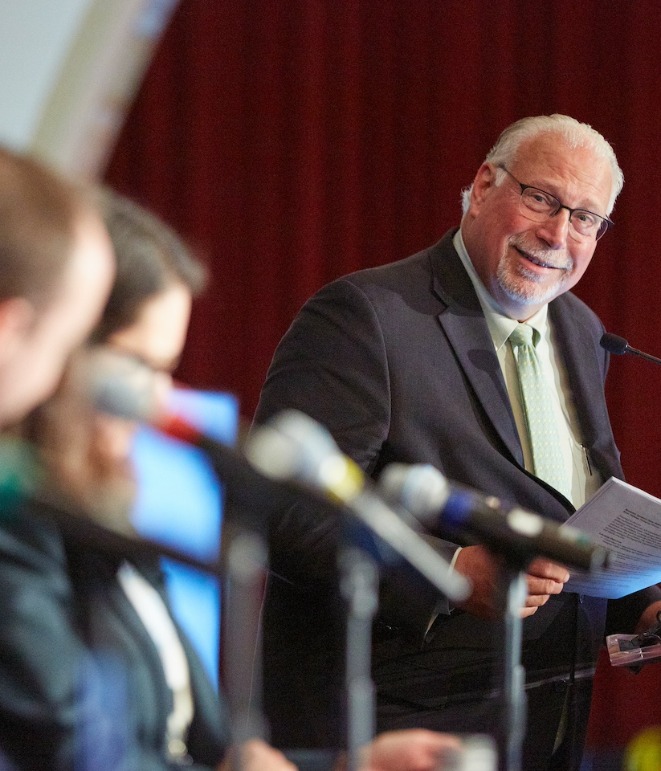
Knight Foundation and USC Marshall Commit $4 Million to Advance Purpose-Driven AI Research
The research initiative aims to create ethical, human-forward outcomes for cutting edge technology like AI.
USC Leventhal Hosts 42nd Annual SEC and Financial Reporting Institute Conference
USC Leventhal Hosts 42nd Annual SEC and Financial Reporting Institute Conference
The premier annual gathering gave accounting executives and industry leaders direct access to SEC policy setters.

Anthony Aaron, director of the USC SEC and Financial Reporting Institute and a professor of the practice of accounting introduces a panel at the 42nd annual SEC Conference.
[USC Photo/William Vasta Photography]
Big Rs and little Rs, ICFR and DCP, GAAP and Non-GAAP, derivatives and disclosures. Speaking in code, accountants, auditors, and preparers gathered for the 42nd Annual SEC and Financial Reporting Conference held at Town and Gown on Thursday, June 6. Over 700 people gathered in person and online to listen and learn from the policy setters from the U.S. Securities and Exchange Commission (SEC) and the Public Company Accounting Oversight Board (PCAOB) and Standard Setters from the Financial Accounting Standards Board (FASB) — a rare occasion that provides direct access to these officials.
USC Leventhal School of Accounting, in partnership for the first time with Financial Executives International, presented the premier annual conference, offering a dynamic intersection of business, accounting, and regulatory policy throughout the panel discussions.
In remarks prior to the event, Dean William W. Holder said, “The conference represents an opportunity in the capital markets to interact personally with standard setters, regulators, and policy setters from the highest level. Given the complexity of our regulatory structure and its rapid evolution, these kinds of communications are of great importance and benefit to our industry.”
Known for its long-standing tradition of excellence in accounting and ties to the business community, Leventhal, through its SEC and Financial Reporting Institute, is well-situated to invite officials from the SEC, the FASB, and the PCAOB to take part in the conference.
“Our conference today, as it does every year, features a distinguished group of speakers from the regulatory and standard setting community, from corporate America, and from some of the largest and most respected professional services firms,” said Anthony Aaron, director of the USC SEC and Financial Reporting Institute and a professor of the practice of accounting, in his welcome remarks.
The day’s various panels took a deep dive into relevant issues including financial reporting, accounting, auditing, and SEC enforcement. The program began with a keynote address by Paul Munter, chief accountant for the Office of the Chief Accountant of the SEC. Joining by video, he described the primary function of the SEC is to ensure companies provide high-quality information that will benefit investors.
“We are, at our core, an ‘investor protection agency,’ and so high quality financial reporting for investors is not only a goal or an outcome, but it’s really a part of the foundation of our global economy,” Munter said.
High-quality financial reporting for investors is not only a goal or an outcome, but it’s really a part of the foundation of our global economy.
— Paul Munter
Chief Accountant for the Office of the Chief Accountant of the SEC
The SEC’s chief accountant encouraged attendees to remain vigilant that “financial and corporate reporting is, first and foremost, a communication activity with investors … that requires compliance with the applicable financial reporting framework and SEC rules and regulations.”
While giving key updates on new standards and rules, Munter also harkened back to the purpose of the commission when it was founded in 1934. He reminded the audience that financial statements have to be prepared in a manner that is not misleading and in accordance with standards that have substantial authoritative support.
Beginning with Munter, the guest speakers invited the participants to engage with the SEC and FASB and provide insights and perspectives as part of the standard-setting process.
“To be most effective, we encourage stakeholders to provide constructive feedback that helps the FASB identify timely and cost-effective solutions that address investor needs,” Munter said.
Richard R. Jones, chair of the FASB, agreed, adding “We can only succeed [by] understanding what information moves the needle for investors.”
The role of the FASB is to develop and issue financial accounting standards, supporting the financial reporting process with useful information for investors. The agency’s inclusive process includes gaining stakeholders’ feedback that identifies new and emerging issues as well as outreach to investors to confirm that recent standards are addressing their concerns.
Jones continued by highlighting the seven most cited recent topics that investors use to inform their investments. He provided insights on digital assets, income taxes, disaggregation of income statements, ESG transactions and disclosures, intangible assets (including software), cash flows, and key performance indicators (KPIs) to close out his fireside chat, which was moderated by Mark Kronforst, a partner at Ernst & Young LLP.
In subsequent panels, pearls of wisdom were shared including Melissa Rocha’s “Disclosures answer the why.” The deputy chief accountant at the SEC (Division of Corporation Finance) advised participants to always focus on “facts and circumstances.”
When discussing current accounting practices, Hillary H. Salo, chair of the Emerging Issues Task Force (EITF), shared that depending on your business model, the FASB “may want different kinds of info.” Her panel reviewed numerous updates including accounting for and disclosure of software costs, government grants, environmental credit programs, and the statement of cash flows, among others.
Enforcement may be a dreaded word to some, but Ryan Wolfe, chief accountant at the SEC (Division of Enforcement), sought to demystify what his department does when his panel started.
“If you’re doing your job, you shouldn’t worry about someone like me,” Wolfe said.
The goal, he continued, is “to deter misconduct and find solutions that preserve confidence in our capital markets.”
Munter’s keynote set the tone for the day as succeeding speakers reiterated a crystal clear message: “Do not sacrifice integrity and professionalism for the sake of profit and growth.”
More than 700 accountants, auditors, and preparers gathered for the 42nd Annual SEC and Financial Reporting Conference held at Town and Gown on Thursday, June 6.
[USC Photo / William Vasta Photography]
During the opening fireside chat, Richard R. Jones, chair of the FASB, said, “We can only succeed [by] understanding what information moves the needle for investors.”
[USC Photo / William Vasta Photography
Offering pearls of wisdom for financial reporting practices, Melissa Rocha, deputy chief accountant at the SEC (Division of Corporation Finance), advised participants “Disclosures answer the why.”
[USC Photo / William Vasta Photography]
Dean William W. Holder acknowledges the crowd during his opening remarks. Previously he noted, “The conference represents an opportunity in the capital markets to interact personally with standard setters, regulators, and policy setters from the highest level.”
[USC Photo / William Vasta Photography]
RELATED
Knight Foundation and USC Marshall Commit $4 Million to Advance Purpose-Driven AI Research
The research initiative aims to create ethical, human-forward outcomes for cutting edge technology like AI.
Quoted: Baizhu Chen in Reuters
Chen explains how South Korea’s relatively small economy makes it difficult to gain leverage in trade deals with the United States.
Cited: Shon Hiatt in E&E News
Google, NextEra strike deal to restart Iowa nuclear plant
Sports Leaders Discuss Athlete Business Savvy, LA28, and Student Learning Opportunities at Next Level Sports Conference
Roger Goodell, Maria Sharapova, Chris Paul, and Casey Wasserman spoke at the second annual NLS Conference, hosted by USC Marshall and USC Annenberg.
Quoted: S. Mark Young in BBC
Young dissects the fallout of celebrity tell-all memoirs and the potential harm they cause.